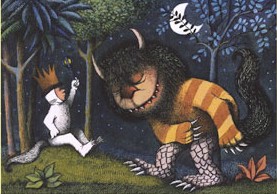 Maurice Sendak writes and illustrates children’s literature. In “Where the Wild Things are”, Max, his young hero, furious with his mother and banished to his room, dresses in his wolf suit and imagines he is King of the Wild Things and can reek whatever mayhem he chooses. In the real world we are less powerful. Dealing with pain and anger is more complicated.
Maurice Sendak writes and illustrates children’s literature. In “Where the Wild Things are”, Max, his young hero, furious with his mother and banished to his room, dresses in his wolf suit and imagines he is King of the Wild Things and can reek whatever mayhem he chooses. In the real world we are less powerful. Dealing with pain and anger is more complicated.
What causes these feelings will be different for each of us. Maurice Sendak is a Jew. He’s distressed and angry about the holocaust. He says he will never let it go. But not everyone wants to let the anger linger in their hearts. In some cases, this kind of pain can become the source of an energy which works to change things. In others they feel like a burden which we would be glad to set down and leave behind.
Max soon tires of raging around in the Wild Things’ forest and wants to return to where “someone loved him best of all”. When we struggle to let go of pain and anger, it helps to know that we are in the presence of one who loves us. Strong unwanted feelings can fade, if we let them, in the warmth and acceptance of the love of a parent, a lover or a friend. God too, in the imagery of the bible, offers “everlasting arms” and, held by them, we can feel safe enough to unburden ourselves of some of our rage and pain.
Jesus shows on the cross God’s willingness to be the recipient of human anger and aggression. He’s strong enough to take our despair and rage. Perhaps today we might consider whether there are feelings of which we want to let go and, if there are, seek the presence of a love which will help us do it.
Read: Do not let the sun go down on your anger (Ephesians 4.26)
Rejoice: in those with whom it’s safe to be angry.
Reflect: How do I normally deal with anger?
Remember: if what I learnt from my parents was that being angry made me unlovable, I need to unlearn it.
Resolve: if I feel angry with God, to tell him.
